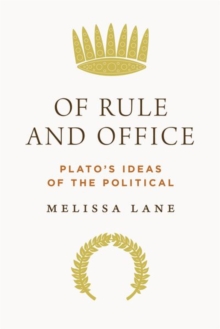Description
| Product ID: | 9780691192154 |
| Product Form: | Hardback |
| Country of Manufacture: | GB |
| Title: | Of Rule and Office |
| Subtitle: | Plato's Ideas of the Political |
| Authors: | Author: Melissa Lane |
| Page Count: | 480 |
| Subjects: | Ancient Greek and Roman philosophy, Western philosophy: Ancient, to c 500, Social and political philosophy, Political science and theory, Political ideologies and movements, Political structures: democracy, Social & political philosophy, Political science & theory, Political ideologies, Political structures: democracy |
| Description: | Select Guide Rating A constitutionalist reading of Plato’s political thoughtPlato famously defends the rule of knowledge. Knowledge, for him, is of the good. But what is rule? In this study, Melissa Lane reveals how political office and rule were woven together in Greek vocabulary and practices that both connected and distinguished between rule in general and office as a constitutionally limited kind of rule in particular. In doing so, Lane shows Plato to have been deeply concerned with the roles and relationships between rulers and ruled. Adopting a longstanding Greek expectation that a ruler should serve the good of the ruled, Plato’s major political dialogues—the Republic, the Statesman, and Laws—explore how different kinds of rule might best serve that good. With this book, Lane offers the first account of the clearly marked vocabulary of offices at the heart of all three of these dialogues, explaining how such offices fit within the broader organization and theorizing of rule. Lane argues that taking Plato’s interest in rule and office seriously reveals tyranny as ultimately a kind of anarchy, lacking the order as well as the purpose of rule. When we think of tyranny in this way, we see how Plato invokes rule and office as underpinning freedom and friendship as political values, and how Greek slavery shaped Plato’s account of freedom. Reading Plato both in the Greek context and in dialogue with contemporary thinkers, Lane argues that rule and office belong at the center of Platonic, Greek, and contemporary political thought. A constitutionalist reading of Plato’s political thought |
| Imprint Name: | Princeton University Press |
| Publisher Name: | Princeton University Press |
| Country of Publication: | GB |
| Publishing Date: | 2023-06-20 |


